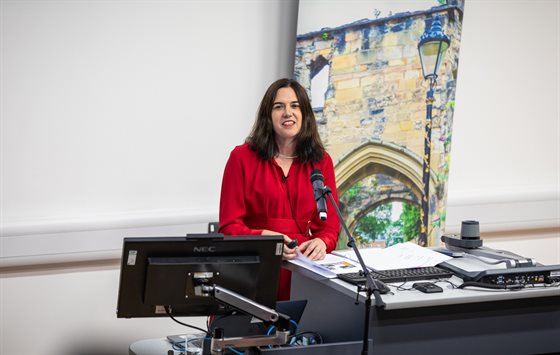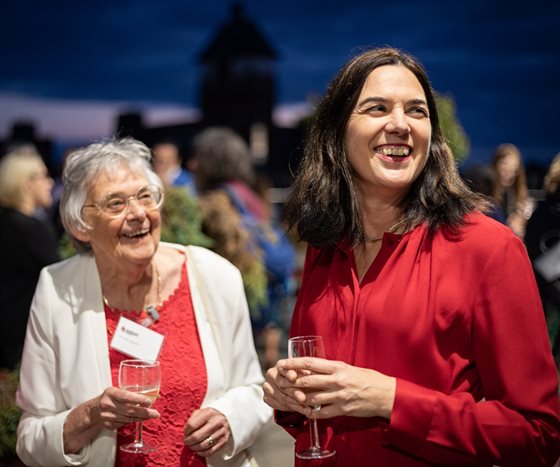Vice-Chancellor says empowering students is true value of modern university
The Vice-Chancellor of De Montfort University Leicester (DMU) has said that universities need to “empower people” to be of value in the modern world.
In her inaugural lecture for the university, Professor Katie Normington took on the questions being raised by media and the public about the worth and value of universities, illustrating the many ways university work has contributed to modern life, and described the role she felt institutions needed to play in the 21st century.

Vice-Chancellor Professor Katie Normington
She described how DMU’s new strategy would empower staff and students to create a fairer society – an aim she felt was the essence of DMU’s purpose as an institution.
And she unveiled a new scholarship scheme called Gifted Beyond Their Years, which provides financial support to students whose challenging circumstances mean they would not otherwise be able to attend DMU.
The lecture was titled ‘The Invisibility of the Real University: How can we reset public perception of the usefulness of higher education?’
Watch a subtitled version of the lecture
It was a chance, she told the audience, to talk about “the public perception of universities, how we present ourselves as universities to the outside world, the real usefulness of a university and what we might do at DMU and within the region to reset the way that we are seen.”
After an introduction by Ian Squires, Chair of the Board of Governors at DMU, Professor Normington took to the lectern at the front of a lecture theatre in the Vijay Patel Building.

Professor Normington and Ian Squires, Chair of the Board of Governors at DMU
She began with a potted history of universities in Western civilisation, from the initial elite, private institutions in Oxford, Bologna and Paris, diversifying from theology into science through to the founding of the Open University in the 1960s and the transformation of polytechnics into universities and the introduction of students directly paying fees in the 1990s.
Moving to DMU itself, Professor Normington told the history of the university through its varied prospectus covers, illustrating the shifting focus on what a university stands for within the higher education sector.
She said: “The DMU prospectuses tell a history of universities as places of skill, as windows of future opportunity, as epicenters of facilities, of conglomerations of people, of inspirational ideas and new knowledges. That’s how we have been presenting ourselves.”
But, she said, that was at odds with the story being told in the media with universities frequently presented as “unnecessary, wasteful of time and money, inept at dealing with contemporary crises, largely an unwanted luxury”.
The question universities needed to successfully answer to address that discrepancy, Professor Normington said, was, “what value do we gain from universities and how do we measure and demonstrate that?”

She cited research breakthroughs such as Oxford’s Covid vaccine and DMU Professor Katie Laird’s important work on how Covid is transmitted through medical materials and work clothing. She looked at those novelists and authors who taught in universities across the country.
In sport, Professor Normington considered the impact university-taught athletes had at the Olympic Games and, in culture, the achievements by graduates such as the classical composer Handel and acoustic songwriter KT Tunstall.
And more widely, she looked at the university projects which are improving the environment. “Even the air I breathe,” said Professor Normington, “is affected by university research.”
Besides the work and output, she considered the social impact, the friends she had made at university who have remained close friends for life.
In order to bring this work more clearly into the world – and change the public perception of higher education and its worth, Professor Normington said universities needed to empower their staff and students.
She said: “Our new strategy sets us out as an ‘empowering university’. Central to that is our mission of providing a ‘Gate of Opportunity’ that empowers our students, staff and partners to create a fairer society.
“Our ambition for the region, to level up, to close the skills and the productivity gaps of the city and the region will enable us to discover the real functions of university and make the invisible visible.”
Posted on: Friday 24 September 2021